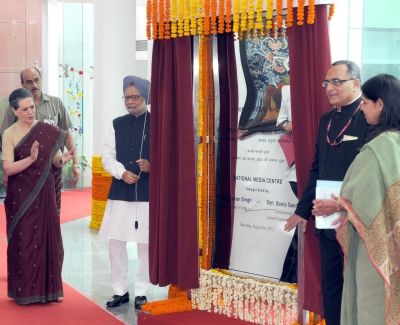 Following is the text of the Prime Minister Dr Manmohan Singh's address at the inauguration of the national media centre in New Delhi on Saturday.
Following is the text of the Prime Minister Dr Manmohan Singh's address at the inauguration of the national media centre in New Delhi on Saturday.
"It gives me immense pleasure to be here today on an occasion that represents a milestone in public engagement. The inauguration of the national media centre is not only about unveiling New Delhi’s latest landmark. This Centre also showcases our ability to keep pace with similar state-of-the-art facilities across the world. It symbolises the vibrant mood of the existing media landscape in our country. As a ‘communication hub’ and a ‘single window’ facility, I am sure it will fulfill the needs and requirements of our media fraternity, many of whom are present here today.
The exponential growth in India’s media sector began during the decade of the nineties. The media, not coincidentally, were among the principal beneficiaries of the wave of economic reforms that were introduced in the country during that period. Growing economic activity created the need for better and more intensive communication, which itself had a commercial aspect to it. A virtuous cycle came about in which the increased reach of media, both print and electronic, opened up ever newer markets, which benefited producers and consumers alike. In fact, I would like to think that the phenomenon of India as a world power in cricket has something to do with the fact that our electronic media are able to create and unite a huge block of consumers, reaching which is the dream of many marketing professionals.
The story of reform and liberalisation in the media sector, which is a continuing one, is obviously a success story. The size of the media industry alone demonstrates that very amply. But the media are not merely a mirror of business activity; they are a reflection of the entire society at large. Economic reform and liberalisation over the last two decades and more have wrought great societal change in our country. Our media have reflected this process and also been affected by the associated changes. I would even say that the pace of these changes has been so rapid that the documentation of its impact on the media has been somewhat inadequate. Technological advancements like the Internet, telecom revolution, low cost broadcasting, social media and cheaper publishing facilities that exist today were inconceivable two decades ago.
Change inevitably brings challenge in its wake. Those of you who are the practitioners of the media industry have a very special responsibility to assess, tackle and overcome the challenges that two decades of socio-economic change have brought about. In a vibrant democracy such as ours, which revels in free enquiry and quest for answers, this is a significant calling. But there is need for caution while executing this responsibility. A spirit of inquiry must not morph into a campaign of calumny. A witch-hunt is no substitute for investigative journalism. And personal prejudices must not replace the public good.
At the end of the day, credibility is the media’s currency and is integral to its contract with the reader or viewer. There is also the question of a certain responsibility for social harmony and public order. I emphasise this particularly in the light of the social media revolution, which is rendering irrelevant the lines between a connected citizen and professional journalist. A mature and wise handling of this phenomenon is essential if we are to avoid the tragedy last year that befell many innocent souls who became victims of an online propaganda campaign and were then driven across the country to save their lives in their home states.
It is a reality that journalism cannot be divorced from the business of which it is a part. The responsibilities of a media organisation are not limited to the viewers and readers alone. The companies also have an obligation to their investors and shareholders. The tussle between bottom lines and headlines is a fact of life for them. But this should not result in a situation where media organisations lose sight of their primary directive, which is to hold up a mirror to society and help provide a corrective.
The media and civil society are an essential part of democracy and nation building. Now that we are at a decisive stage in taking our rightful place in the comity of nations, I am confident that they will not be found wanting in this collective effort to consolidate India as a plural, inclusive and progressive society.
I would also like to take this opportunity to reiterate the commitment of the UPA government in fostering a free, pluralistic and independent media. Our initiatives aim to bridge the ‘information divide’ and to provide our citizens knowledge and information so as to equip them to respond to social, economic and technological challenges. Our communication architecture is aimed at empowering our people with quality information. Through the innovative use of social media, I am confident that our government will address and strengthen the communication needs of an aspirational India and connect with our younger generations.
The national media centre is just the latest step in addressing the diverse communication needs of our country in the future. I congratulate the Ministry of Information and Broadcasting on this achievement and urge it to remain at the cutting edge of media innovation.
Image: Prime Minister Dr Manmohan Singh unveiling the plaque to inaugurate the National Media Centre in New Delhi. UPA chairperson Sonia Gandhi, Secretary, Ministry of Information and Broadcasting Bimal Julka and Principal Director General (M&C), Press Information Bureau Neelam Kapur are also seen.
Photograph: PIB












 © 2025
© 2025